


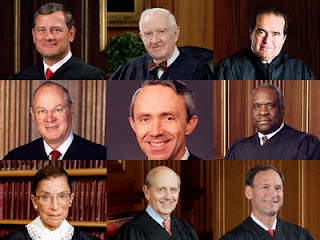
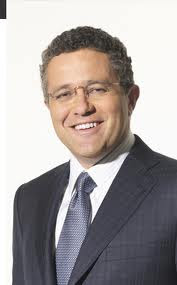
5,4,3,2,1.....
Countdown to the SCOTUS Ruling on "Obamacare"/ Affordable Health Care Act.
American and Global Leaders are sitting on the edge of their seats awaiting a Landmark Legal Decision from the SCOTUS Justices regarding the future of Pres. Obama's Universal Affordable Health Care Act i.e., "Obamacare".
Will "Obamacare" be upheld or will it be struck down?
I Pray to God that it is Upheld.
Here's why I've come to this conclusion.
Even though its clear the Controversial Individual Mandate Provision is a TAX, it won't be the First time Congress has used its Taxing Authority to enact such a Broad law.
In fact here are 3 Examples of how Congress has previously used its Taxing Authority:
1) IRS - To Lay and Collect Taxes, Duties, Imposts, and Excises
2) Pay Debts for Common Defense and Warfare
3) Enact Legislation for Medicare Advantage/ Part D i.e., Prescription Drug Pricing.
So for anyone to complain about the Overreach or Misuse of Congressional Authority as it relates to "Obamacare" is completely Hypocritical and could be perceived as RACIST.
Because I currently reside in North Carolina (one of the Most Corrupt States EVER), I have witnessed firsthand the Fate of Citizens who lack Health Care Insurance.
North Carolina residents who lack Health Care Insurance or who are Underinsured are either Overbilled by local Hospitals who later Sue those Citizens or..... allowed to DIE.
YES! Its True!!
In North Carolina they will let you DIE if you lack Health Care Insurance or are Underinsured, even if you are a Working Citizen!
And although Health Care Insurers are NO longer Legally allowed to Deny Coverage for Children & Youth up to the age of 19, (Effective 2011) including Children with Preexisting Conditions, many Large Insurers are still Denying Coverage for those Children & Youth as they await the SCOTUS landmark ruling.
Health Care Insurers such as Wellpoint, Anthem, United Health Care, Blue Cross/Blue Shield, etc.,
In other words Wellpoint, Anthem, United Health Care, Blue Cross/Blue Shield, have Refused to Obey Federal Law until they hear what the pending SCOTUS ruling will be.
How do I know this to be true?
Because one of the Vendors United Health Care uses to enroll citizens into UHC Health Care plans is still dropping Children & Youth who have Preexisting Conditions and is Refusing to enroll Children with Preexisting Conditions.
Perhaps the Obama Administration should check out which Vendors United Health Care is paying to Enroll Clients during Annual Open Enrollment periods, to see if those Vendors are Complying with Federal Law.
Inspite of the Tax issue I believe "Obamacare" will actually Save Lives and.....
Create Hundreds of thousands of JOBS in the Health Care Field for at least the next 5 Years.
Especially for many Low Income & Unemployed Middle Class Citizens.
Via the Affordable Health Care Act, Low Income & Unemployed Middle Class Citizens can be Trained to become Full-time Licensed Health Care Insurance Agents and Medical Billing Specialists.
Those JOBS pay well & can help create Upward Mobility.
When people have MONEY, they Spend MONEY, thus America needs "Obamacare" to be enforced!
Pres. Obama's Re-election team needs to continue to drill home ALL Advantages of the Affordable Health Care Act from now until November regardless of the pending SCOTUS decision.
Its the eve of the SCOTUS' decision on "Obamacare".
So what should Pres. Obama's Re-election team be doing?
Shouting "Obamacare's" Advantages from America's Mountaintops!!!
If "Obamacare" is Struck down by the SCOTUS Court what should Pres. Obama's Re-election team do?
Tell everyone in America, especially people who reside in North Carolina, what a Great Loss to Millions of Uninsured & Underinsured Citizens it is to them for SCOTUS Justices to have destroyed a Law enacted to Help Save Lives all for the sake of Election Year Politics.
Dear God For the sake of Millions of Americans badly in need of Health Care, I Pray the Affordable Health Care/ "Obamacare" is upheld.
Amen.
Self-Interest Meets Mandate
Within the next few days, the Supreme Court may strike down the provision in the Affordable Care Act requiring every American to buy health insurance. Odds that the justices will reject this measure, the so-called individual mandate, are approaching 80 percent on Intrade, a market where investors can bet on the outcome of pretty much everything.
What’s harder to figure out is what will then happen to health insurance. Advocates of health care reform argue that eliminating the mandate could gut the president’s plan. Most health economists would probably agree.
But this consensus is based on a fairly optimistic view that the individual mandate and accompanying fines for failing to comply will be highly effective at persuading Americans to buy health insurance that they would otherwise forgo. On that score, the mandate might matter less than its advocates believe.
Ultimately, the answer will depend on Americans’ behavior. Specifically, how far will we go for a free lunch?
The case for the individual mandate rests on the belief — shared by most economists — that most people go through life seeking the best possible deal, always looking to get the most out of any given situation.
The health care act requires insurers to charge everybody the same rates regardless of their health status. Healthy Americans could save money by dropping their insurance until they were sick.
Think of a world in which people bought car insurance only when their car was lying crumpled in a ditch after an accident and you’ll understand why an insurance market like this would implode.
Health insurance could fall apart even if some healthy people initially kept their policies. Insurers’ costs would increase as more sick Americans took out insurance even as healthier Americans dropped theirs. Insurers would then raise their premiums, inducing even more healthy Americans to dump their insurance. Insurers would ratchet up premiums again. And so forth.
The individual mandate — which comes with a fine ranging from $695 for poor Americans to $12,500 for rich families who choose to remain uninsured — is aimed at discouraging this behavior. But some critics have argued that the stick is not nearly big enough.
Americans could pay the fine and still save money by skipping health insurance. Paul Starr, a professor of sociology at Princeton, notes that the government has little power to enforce the fines. It can’t impose criminal sanctions or liens on the property of those who do not comply. It can’t garnish their wages. The most it can do is withhold their tax refunds. Mr. Starr says he believes that in the end, the mandate will largely be ignored.
In this narrative, health reform fizzles regardless of the mandate’s fate. With too few healthy Americans buying insurance, there would be enormous pressure to drop the requirement that insurers cover everybody at the same rates regardless of their health status, leaving insurers free to set premiums according to health profiles. And higher premiums would force many sick Americans off the insurance rolls.
Yet the portrayal of Americans as pure profit-seeking machines relentlessly on the lookout for a bargain is not entirely accurate. Sure, we appreciate a good deal when we see one. People have been known to do weird things to make, or save, an extra buck. When King William III introduced a tax in 1696 based on the number of windows in people’s homes, the English responded by blocking their windows.
But there is plenty of evidence that other motivations influence our decisions: altruism, for instance. We like to believe we are fair and worthy. And we are willing to sacrifice some gain to fit the norms of society. “The extreme view, that given the slightest opening people will grab anything they can get their hands on, is clearly wrong,” notes Richard Thaler, an economist at the University of Chicago.
Social norms explain why we tip a cabdriver we will never see again, why cheaters blush when caught or why people go to the polls despite knowing their individual vote will make no difference. Government programs to help underwater homeowners have been held back for years over fear that they will encourage families who were still current with their mortgage payments to default. However, the evidence so far is that most people who can pay their mortgage do, even if they would profit from walking away.
Social norms can provide a much more powerful incentive than money. A few years ago, a handful of day care centers in Israel tried to get parents to pick up their children on time by imposing a fine for tardiness. Much to their surprise, tardiness mushroomed. The fine had somehow made it acceptable, erasing the shame parents used to feel when they were late. The fine, by contrast, was cheap.
Advocates of health reform argue that the individual mandate will create a social norm that will hold everything together. Without it, people merely have a subsidy to induce them to buy insurance. The mandate turns buying health insurance into the rule of the land, like paying taxes.
Jonathan Gruber, an economist at the Massachusetts Institute of Technology who worked on modeling the president’s health care reform, says he believes that eliminating the mandate will gut the president’s plan. Only 10 million uninsured Americans would buy health insurance, he estimates, 22 million fewer than if the mandate remains.
He has evidence to back up his analysis: the health reform introduced in Massachusetts in 2006 by Gov. Mitt Romney, of which Mr. Gruber was a key architect. The state’s program, which gradually put people under a mandate, led to a big jump in the enrollment of the young and healthy when the fines began.
A study by the America’s Health Insurance Plans, an industry lobby group, found that the insurance market collapsed when states passed health reforms in the 1990s requiring insurers to cover everybody at the same price but without a mandate requiring the healthy to be insured. Kentucky, for instance, was left with one insurer in the individual health insurance market.
Even though the mandate may not be quite as powerful as Mr. Gruber believes, several analyses have concluded that it would pack substantial punch. The Congressional Budget Office estimated that without a mandate, 16 million fewer Americans would be insured. A study by the RAND Corporation said the number of newly insured would drop to 15 million without the mandate, from 27 million with it.
And yet Mr. Starr of Princeton has a point: for social norms to work, they probably need to be perceived as legitimate. Governor Romney’s health reform passed with large bipartisan support in the state Legislature. Support for the law in Massachusetts rose from 48 percent when it was enacted in 2006 to 58 percent in 2007, when its provisions began to kick in, and 64 percent in 2008. By contrast, two-thirds of Americans want the Supreme Court to do away with all or part of Obamacare.
Making the mandate work requires convincing Americans that the new health care law is not a plot to destroy the nation. Americans would have to embrace universal coverage as a desirable goal for a rich industrial society. Otherwise, President Obama’s reform may deliver the health care equivalent of a bunch of blocked English windows.
The Supreme Court’s decision will be beside the point.
View Larger Map
Sources: CBS News, CNN, NY Daily News, NY Times, Youtube, Google Maps




















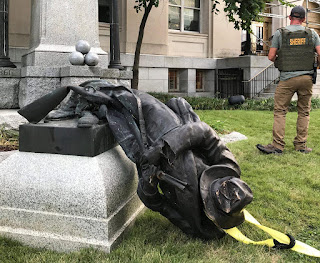

























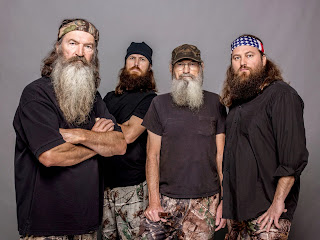






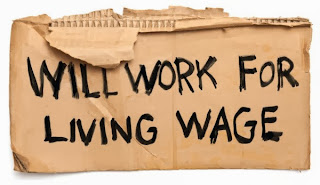





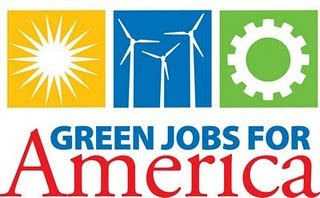






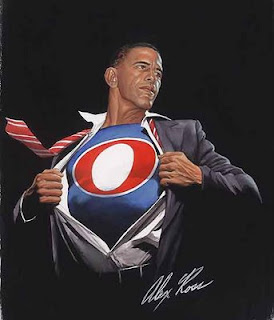




.jpg)








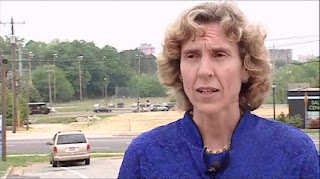














No comments:
Post a Comment